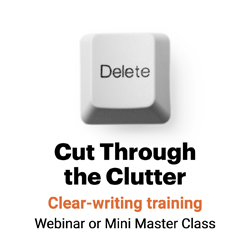Readers face the equivalent of 174 newspapers a day
Talk about TMI: Your readers receive the data equivalent of 174 newspapers a day[1] — ads included. Or so says a study by USC’s Annenberg School for Communication.

Forget kilobytes, megabytes, gigabytes and terabytes. The volume of information in the global datasphere is expected to reach 175 zettabytes by 2020 [PDF], according to IDC.[2]
In just one minute, according to VisualCapitalist[3]:
- People send 12 million iMessages
- Snapchat users sent 2 million Snapchats
- Twitter users post 575,000 tweets
- Facebook users share 240,000 photos
- Slack users send 148,000 messages
- Microsoft Teams connects 100,000 users
- Instagram users share 65,000 photos
- Zoom hosts 856 minutes of webinars
Not to mention billboards, blog posts, RSS feeds, social media and social networks, snail mail and all of the other sources of information out there. Alvin Toffler’s book Future Shock didn’t start to imagine all of this incoming information.
“We’ve created more information in the last five years than all of human history before it,” says author and neuroscientist Daniel Levitin.[4]
What’s the cost of these huge amounts of information? And how can our messages break through the clutter?
What does information overload cost readers?
All of these pieces of information cause:
1. Stress
When information overload occurs, trying to manage information can deplete and demoralize you, according the Harvard Business Review.[5] Indeed, nearly 80% of respondents to an NPR survey said they get headaches, insomnia or eye twitches as a result of information overload.[6] Information overload can lead to real feelings of anxiety, feeling overwhelmed and powerless, and mental fatigue.[7]
Three in 10 U.S. adults are online “constantly” online, according to the Pew Research Center.[8] And 20% of Americans “constantly” monitor their social media feeds.[9]
That constant exposure to news produces sadness, anxiety and stress, according to research by Wendy M. Johnston and Graham C. L. Davey.[10] Cortisol and other stress-related hormones have been linked to inflammation, rheumatoid arthritis, cardiovascular disease and other serious health concerns.[11]
It’s no wonder that “wired” means both “connected to the internet” and “high, frantic, unable to concentrate,” writes Johann Hari, a UK journalist.[12]
Some people even suffer Email Apnea. That’s author Linda Stone’s term for the “unconscious suspension of regular and steady breathing” when tackling the inbox.[13]
And trying to keep up by multitasking actually produces more stress hormones, The Economist reports.[14]
2. Exhaustion
The term information overload makes sense. In this environment, our brains “have trouble separating the trivial from the important,” neuroscientist Daniel Levitin told NPR. “All this information processing makes us tired.[15]
And that exhaustion, perhaps fittingly, makes it even harder for us to process information.
“News fatigue brought many of the participants to a learned helplessness response,” say researchers of an Associated Press study on the effect of reading news.[16] “The more overwhelmed or unsatisfied they were, the less effort they were willing to put in.”
How much effort are they willing to put in to get through your messages?
3. Attention Deficit Trait
We consume, on average, 63 gigabytes of media a day. That’s according to a report by the University of Southern California’s Institute for Communications Technology Management.[17] That’s the equivalent of:
- 63 hours of streaming video[18]
- 63,000 hours of streaming music
- 10,000 times the Complete Works of Shakespeare[19]
That’s 15.5 hours of media a day — not including time at work.[20]
Let’s assume that eight hours at the office plus nearly 16 hours of watching, listening and reading still equals a 24-hour day. If we also assume sleep, then it becomes obvious that we’re multitasking, not focusing on, this information.
Plus — SHINY OBJECT! — that information interrupts us constantly. Texts, emails and urgent Facebook updates interrupt us every five to 12 minutes, according to information analyst and researcher Nathan Zeldes.[21]
People have a hard time managing in this environment. Keeping up with the latest update somehow starts to seem more important than focusing on important projects. That makes it tough to complete a task.
“We’re fooled by immediacy and quantity and think it’s quality,” says Eric Kessler of Pace University’s Lubin School of Business. “What starts driving decisions is the urgent rather than the important.”[22]
In fact, we’re so conditioned to interruptions, that if information doesn’t interrupt us, we interrupt ourselves, researcher Gloria Mark reports.[23] No wonder, according to Microsoft research, our attention spans last only eight seconds.[24]
That’s where Attention Deficit Trait[25] comes in. Psychiatrist Edward Hallowell, an expert on Attention Deficit Disorder, coined the term. He believes that the modern workplace’s information load causes symptoms similar to those of the genetically based disorder.
4. Reduced IQ
Information multitasking temporarily lowers your IQ by more than 10 points, according to a Hewlett Packard survey of 1,100 Britons. Smoking weed, in comparison, costs only four IQ points. (And, from what I’ve read, is a much more interesting way to get stupid.)
The result, according to BuzzWhack.com, is “mental Pez.” That is, “to be hit with so much information that it becomes impossible to focus on one thing. So stuff goes from top-of-mind to tip-of-tongue, only to eventually fall out of our head completely.”
What does information overload cost organizations?
All of which means that your organization’s workforce is stressed out. Exhausted. Unable to focus on the important. And possibly working with diminished IQ.
What other problems does information overload cause organizations?
1. Communication
It’s so cute that we think they’re actually reading that intranet piece on the company’s move to develop an agile workforce. Best case scenario: They’re looking at the pictures while watching Yellowstone, listening to Hamilton and texting their spouses a grocery list.
No wonder information overload during a health crisis leads to information avoidance.[26]
2. Productivity
Employees spend nearly half their workweeks reading emails and finding information[27], according to an analysis by the McKinsey Global Institute.[28]
Email fatigue and constant notifications cause employee burnout.[29] “Almost two in five (38%) of office workers say email or chat is the remote work nuisance most likely to lead them to quit their jobs,” according to a 2021 survey by Wakefield Research.
Add sharing that information in-house, and that leaves just 39% of their workweeks for doing their jobs.
And remember all those interruptions? One every five to 12 minutes?
Each time employees are interrupted by email, it takes an average of 24 minutes to get back to work, according to a study by Microsoft researchers.[30] And, when your task is interrupted, Zeldes says, it takes 20% to 40% more time to complete it.[31]
Plus, whether they’re ER doctors, accountants, 401(k) plan owners or others, overloaded employees make bad decisions.
BuzzWhack calls it the “dopeler effect” — “the tendency of stupid ideas to seem smarter when they come at you rapidly.”
3. Money
American knowledge workers waste a quarter of their time dealing with huge data streams, according to The Information Overload Research Group.[32] That costs the U.S. economy $997 billion a year.
4. And more …
Plus, as if we needed another problem, information overload helps fake news spread.[33]
How do we combat information overload?
Get suggestions for overcoming the overload.
___
Sources:
[1] Richard Alleyne, “Welcome to the information age – 174 newspapers a day,” The Telegraph, Feb. 11, 2011
[2] David Reinsel, John Gantz and John Rydning, “The Digitization of the World From Edge to Core,” IDC, November 2018
[3] Aran Ali, “From Amazon to Zoom: What Happens in an Internet Minute In 2021?” VisualCapitalist, Nov. 10, 2021
[4] Daniel Levitin, “This is your brain on information overload,” KUOW podcast, May 6, 2016
[5] Paul Hemp, “Death by information overload,” Harvard Business Review, September 2009
[6] Manoush Zomorodi, Ariana Tobin and Jen Poyant “Get a Grip On Your Information Overload With ‘Infomagical‘,” NPR’s All Things Considered, January 25, 2016
[7] Sara Gorman, Ph.D., MPH, and Jack M. Gorman, MD, “Is Information Overload Hurting Mental Health?” Psychology Today, June 4, 2020
[8] Andrew Perrin And Sara Atske, “About three-in-ten U.S. adults say they are ‘almost constantly’ online,” Pew Research Center, March 26, 2021
[9] “APA Stress in America™ Survey: US at ‘Lowest Point We Can Remember;’ Future of Nation Most Commonly Reported Source of Stress,” American Psychological Association, Nov. 1, 2017
[10] Wendy M. Johnston and Graham C. L. Davey, “The psychological impact of negative TV news bulletins: The catastrophizing of personal worries,” Wiley Online Library, April 13, 2011
[11] Markham Heid, “You Asked: Is It Bad for You to Read the News Constantly?,” Time, Jan. 31, 2018
[12] Johann Hari, “How to survive the age of distraction,” Independent, June 23, 2011
[13] Linda Stone, “Are You Breathing? Do You Have Email Apnea?” LindaStone.net, Nov. 24, 2014
[14] Schumpeter, “Too much information,” The Economist, June 30, 2011
[15] “Get A Grip On Your Information Overload With ‘Infomagical’” NPR, Jan. 25, 2016
[16] “Young adults suffering from news fatigue, study says,” The New York Times, June 2, 2008
[17] James E. Short, “USC CTM Releases Report on Americans’ Media Consumption,” USC Marshall School of Business, Oct. 28, 2013
[18] Andrew Moore-Crispin, “How many megabytes are in a gig? Understanding mobile data,” Ting, June 21, 2017
[19] “How much is 63 gigabytes?” The Measure of Things
[20] “USC CTM Releases Report on Americans’ Media Consumption,” Oct. 28. 2013
[21] Nathan Zeldes, “Effects of information overload #1: time loss” (PDF), white paper, Sept. 19, 2012
[22] Sharon Begley, “The Science of Making Decisions,” Newsweek, Feb. 27, 2011
[23] “Get A Grip On Your Information Overload With ‘Infomagical’” NPR, Jan. 25, 2016
[24] Kevin McSpadden, “You now have a shorter attention span than a goldfish,” TIME, May 13, 2015
[25] Edward Hallowell, “Attention deficit trait” (PDF), introduction to Driven to Distraction, Dec. 27, 2005
[26] Saira Hanif Soroyaa, et. al, “From information seeking to information avoidance: Understanding the health information behavior during a global health crisis,” Information Processing & Management, Volume 58, Issue 2, March 2021
[27] Email fatigue and constant notifications causes employee burnout. “Almost two in five (38%) of office workers say email or chat is the remote work nuisance most likely to lead them to quit their jobs.”
[28] Michael Chui, James Manyika, Jacques Bughin, Richard Dobbs, Charles Roxburgh, Hugo Sarrazin, Geoffrey Sands and Magdalena Westergren, “The social economy: Unlocking value and productivity through social technologies,” McKinsey Global Institute, July 2012
[29] Eileen Brown, “Remote workers now say email fatigue and notifications are worse than commuting,” ZDNet, April 22, 2021
[30] “Work invaders: the curse of emails, tweets and Facebook,” Evening Standard, Sept. 21, 2009
[31] Nathan Zeldes, Effects of Information Overload, #1: Time loss, Sept. 19, 2012
[32] “Information Overload Research Group takes aim at data deluge,” news release, Feb. 3, 2011
[33] Filippo Menczer and Thomas Hills, “Information Overload Helps Fake News Spread, and Social Media Knows It,” Scientific American, Dec. 1, 2020
Additional sources:
Charles Arthur, “What’s a zettabyte? By 2015, the internet will know, says Cisco,” The Guardian, June 29, 2011
Martin Hilbert and Priscilla Lopez, “The World’s Technological Capacity to Store, Communicate, and Compute Information,” Science, Feb. 10, 2011
Nathan Zeldes, “Effects of information overload #2: cognitive disability,” white paper, Oct. 24, 2012
“E-mails ‘hurt IQ more than pot,’” CNN, April 22, 2005

Leave a Reply